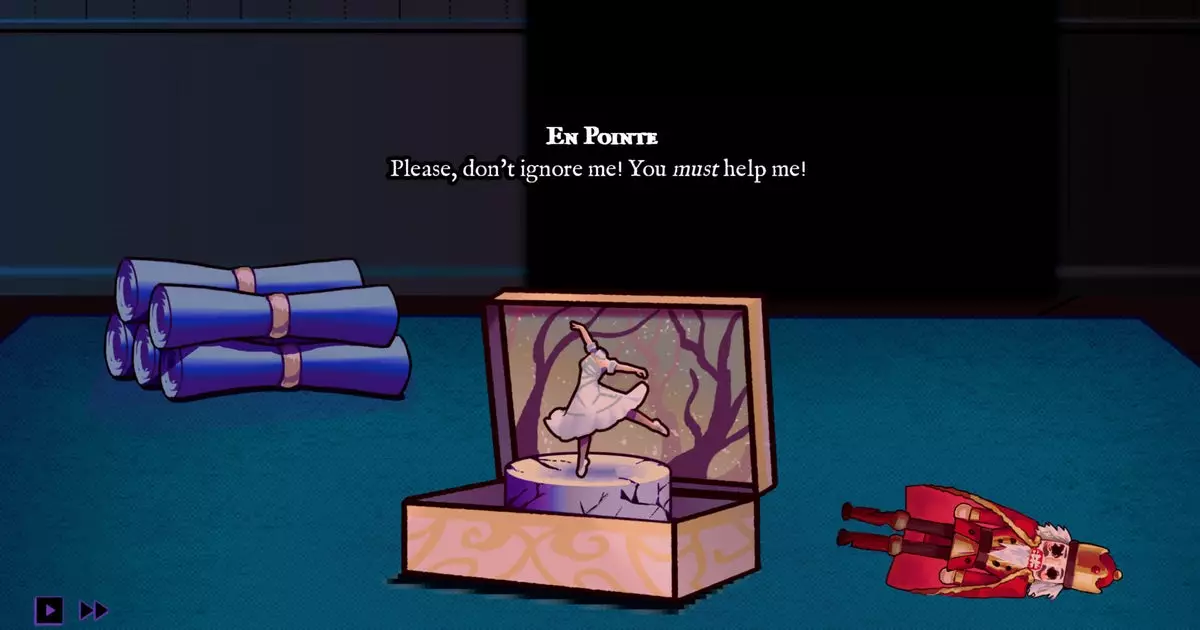At first glance, “Toy Box” seems like a cheerful game, perhaps a holiday treat aimed at younger audiences. However, viewing its trailer quickly reveals an unsettling reality. This unique visual novel, produced by DEADline Studios, spins a narrative that falls squarely within the realm of horror. It challenges players not just with a storyline but also with the moral dilemmas associated with herding cute, seemingly innocent toys into a fate both eerie and macabre. You play as a toy inspector under the command of a mysterious Grand Toy Maker whose presence looms over the proceedings, bringing a sinister undertone to what might initially appear to be innocent fun.
You are tasked with dismantling five toys, guided by cryptic and ominous instructions. Each toy, once disassembled, offers insight into its experiences, but this insight reveals darkness and malice—attributes that counter the expectations of a child’s plaything. The game poses a moral quandary: will you salvage these entities, saving them from a fiery end, or condemn them to destruction? The choice is far from simple, as the toys demonstrate sentience, illustrating the duality of their existence.
While the conventional notion of toys might invoke sentiments of joy and nostalgia, “Toy Box” flips this idea on its head. The characters you encounter—sentient toys that call out for compassion—reveal troubling memories that often involve pain, blood, and an unsettling awareness of their potential demise. This dissonance between the familiar and the grotesque fuels the game’s ambiance and serves as a stark reminder of the precarious line between play and horror.
The cleverly designed narrative draws the player deep into the existential dread manifested through toys, which become emblematic of lost innocence. As players interact with these characters, they must confront the often-ignored reality that lies in the deeper meanings of childhood toys. Are they merely playthings, or do they harbor emotions and narratives worthy of exploration? One is left questioning not just the toys’ histories but also the nature of childhood itself, the implicit fears tied to it, and what happens when the playful facade begins to deteriorate.
DEADline Studios highlights itself as a small but ambitious team comprised of POC and LGBTQ+ members, drawing inspiration from personal narratives and societal issues deeply rooted in human experiences. Their commitment to exploring the human condition through various lenses, including those that are dark and unflinching, is evident in “Toy Box.” The developers aim to engage players by pushing them to examine their moral compass in ways that are not typically seen in mainstream gaming. Games like “Fool’s Paradise,” also from DEADline Studios, showcase their ability to blend horror with narrative sophistication, offering satirical commentary while exploring complex themes.
Furthermore, the content warnings preceding gameplay should not be dismissed lightly; the extensive list of potentially triggering themes confirms that this is not a casual gaming experience. It is a game that invites players to think critically about the horror that exists in both fiction and reality—elements that can often blur and overlap.
At its core, “Toy Box” invites players to take an unorthodox route to storytelling, one that revolves around disassembly and exploration. While dismantling toys might initially conjure thoughts of destruction, it births narratives often ignored or overlooked. Dismantling objects has long served as a metaphor for understanding their true nature, and this game uses that concept as a foundation for deeper psychological commentary.
The paradigm of revealing a narrative through the act of disassembly mirrors experiences found in other gaming realms, such as “Hardspace: Shipbreaker.” However, “Toy Box” takes the concept further by imbuing its components with life and history, thereby framing the inspection process as both a physical and moral challenge. This meticulous handling of objects encourages empathy for their pasts, testing the players’ values against their instinctive responses towards animated nightmares.
“Toy Box” stands as a testament to the potential of video games as a medium for complex storytelling. It intertwines themes of horror with innovative gameplay, forcing players to navigate through moral ambiguity while unraveling the dark histories of toys they once regarded as harmless. The game offers a palpable sense of dread that resonates beyond the screen, urging gamers to recognize the fragility of innocence even within the realms of whimsy. In a landscape often dominated by innocent interactions, “Toy Box” breaks boundaries and encourages a broader spectrum of thematic exploration that is as unsettling as it is captivating.


Leave a Reply